Government, European Union and the Food and Agriculture Organisation (FAO), have launched a €10m project to support 50,000 vulnerable Ghanaians grappling with food security in some parts of the Northern Region of Ghana.
The project is aimed at more economically sustainable and inclusive food systems, empowering communities to build resilient and profitable food production systems and reinforced environmental sustainability of food systems.
It also aimed at enhancing social sustainability and gender responsiveness of food systems and improved governance and institutional sustainability of food systems.
The allocated funds will primarily focus on Planting for Food and Jobs, phase II (PFJ 2.0) target commodities.
These efforts complement the Government initiatives to mitigate the adverse impacts of rising food, fertilizer, and fuel prices in vulnerable areas, to help alleviate poverty, hunger and malnutrition.
Dr. Bryan Acheampong, Minister for Food and Agriculture said this vital financial contribution by the EU reaffirmed the importance of international solidarity in addressing global food security challenges aggravated by Russia’s aggression against Ukraine.
He said it also reflected the shared commitment to ensuring food security, reducing poverty, and promoting sustainable development in Ghana.
The Minister said the EU, through its Member States and Development Programmes, had made significant contributions to Ghana’s economic progress.
“The agricultural sector has received a substantial amount of aid in the form of grants over the years. Under the current 11th European Development Fund, the EU-GAP programme allocated €132 million in grants for various interventions in the agricultural sector,” he added.
Dr Acheampong said the COVID-19 pandemic, Russia -Ukraine crisis, climate change and other factors had exacerbated the situation of many households, who struggled to access adequate and nutritious food.
“These challenges also put pressure on our food systems and require us to rethink our strategies to ensure food security and resilience in a sustainable way,” he added.
The Minister urged all partners to align all ongoing projects and future projects to the PFJ 2.0 to ensure efficient and effective use of resources to achieve the common goal of increased food security, import substitution, increased exports, and job creation.
He expressed appreciation to FAO for the long-standing relations and collaboration through several Policy and Technical Cooperation Projects in support of the agricultural sector.
Mr Yurdi Yasmi, FAO Representative in Ghana, said the project was a three-year emergency initiative to rapidly enhance food security and promote resilience in parts of northern Ghana.
“This is part of an EU regional response to address food crises and economic shocks in African countries which have been hit by global challenges such as the COVID-19 pandemic, the war in Ukraine, climate change, among others,” he added.
The Representative said the support was closely aligned to the EU’s “Farm to Fork Strategy” aimed at ensuring food supply and food security in times of crisis with sufficient and varied supply of safe, nutritious, affordable, and sustainable food to citizens always.
He said it would also seek to ensure a continued impact on enhancing sustainable food production and the resilience of food systems, with intentional efforts to achieve economic, environmental, and social benefits for Ghana’s agrifood systems.
Mr Yasmi said technologies and social innovations would be employed to help increase the efficiency of food production, especially in water efficiency in agriculture.
He said digital agriculture was another technological area that the project would build on to significantly reduce market failures and improve the functioning of the agricultural markets while tapping into the African Continental Free Trade Area.
“The collaboration between FAO, the EU and the Government shows our commitment to rural families in Ghana and ending hunger and malnutrition while supporting the transition to more sustainable agrifood systems,” Mr Yasmi said.
Mr Irchad Razaaly, EU Ambassador to Ghana, said the €10m emergency measure had been mobilised in record time and represented the commitment and solidarity of the EU and its Member States in the face of rising cost of food, and to safeguard food security and transitioning to more resilient food systems in Ghana.
He said women, youth, and value chain actors would receive capacity-building support, access to post-harvest technologies, and training on climate change adaptation, market access, financial services, and pest and disease management.
Business News of Thursday, 21 September 2023
Source: GNA













